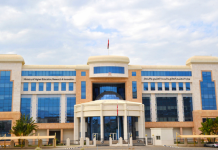BTME’s Outdoor Management Development Programme strikes an enviable balance between having fun and experiential learning. Mayank Singh reports.
Imagine learning leadership skills in the verdant surroundings of Jebel Akhdar or improving your interpersonal skills in the Himalayas. If you think this is a pipe dream, then you need to look no further than Bin Tammam Modern Enterprises (BTME) – a company which has been offering Outdoor Management Development Programme (OMDP) courses for corporates and students in Oman since November 2007. The vision to start something unique which could help the younger generation in the Sultanate came from Salim Tamam al Mashani, chairman, BTME. Says Dr Shirish M Gupte, director, BTME, “We started BTME with its anchor being training. We were not interested in the run of the mill training, but experiential learning. The rationale behind this is that a lot of elements of formal education remains with a person for a lifetime, when taught outdoors.”
The love for outdoors has been a passion for Gupte since his student days. He along with a close friend Vasant Limaye did a lot of trekking and climbing while studying at the Indian Institute of Technology (IIT), Mumbai in places like the Himalayas and the Sahyadri Hills, on the Western Ghats of India. Limaye went on to do a diploma in outdoor education from Edinburg University, UK. On his return he started High Places Management Private Limited, which specialises in outdoors and experiential training and development programmes.
Garudmaachi – the flagship training centre of High Places is located in Mulsi, near Pune in Maharashtra, India. The centre is spread over a 60-acre campus and it boasts of a management development centre, outdoor centre and three-star accommodation facilities for executives. High Places combines outdoors with management development programmes and hence it is called OMDP.
Says Anagha S Gupte, manager – training, BTME, “Our children have forgotten what outdoors are all about, they go to Universal Studios and Disneyland for their holidays, where they do not experience the outdoors or learn much. Being in natural surroundings teaches one various things. For example, rafting teaches you buoyancy; one can learn friction from rappelling; rock structures will teach you about geography.”
Gupte and Limaye presented a paper on these lines titled, ‘Outdoor education is a complementary part of our formal education system’, at the Indian Science Congress in 1991. Though OMDP required a bit of concept selling in India in the 1990s, it has since gained greater acceptance.
Taking roots
In 2007, BTME tied up with High Places to offer a similar programme in Oman. Although OMDP is still in a nascent stage of development in Oman, the company has chalked up an impressive roster of clients like Bank Muscat, Al Omaniya Financial Services, Europcar, Towell Construction, PDO, Saud Bahwan Group, Oman UAE Exchange, Jindal Shadeed Iron and Steel, Sharq Sohar Steel Rolling Mills, Al Jazeera Steel Products Company, in a short span of time.
In Oman, BTME offers a bouquet of options from half day interventions to one and two-day courses. The company has conducted programmes in Jebel Akhdar, Barka and Salalah. The highlight of an outdoor course at Jebel Akhdar or a multi-day programme is rappelling, where one abseils down a rock face. This year BTME is also offering a programme for corporate executives at High Places Garudmaachi Centre.
On an average, the cost of an OMDP ranges from RO50 to RO350 per person. The cost is also a function of the specific requirements of a client. Says Anagha, “Omanis make up to 70 to 75 per cent of the participants in our programmes. A number of them are ladies who have negotiated activities like rappelling, trekking and so on splendidly.”
In an OMDP what is important is not the activity, but the facilitation or debriefing that takes place after the activity. Each activity is related to the objectives of the programme like team building, leadership skills, cross functional team rapport, or orientation into an organisational culture. “Companies are not interested in sending their staff to do a set of 10 exercises but in the soft skills that come out of it. In an office environment we do not discuss our problems because we are conscious about hierarchies, but in an open environment people are more open to voicing their opinions. A number of companies have told us about how the productivity of their staff has increased as a result of these sessions,” avers Anagha.
Apart from companies, BTME is also trying to promote a love for the outdoors amongst school students. The company has been working with Indian School Al Ghubra (ISG) for the last seven years. Over the years, it has taken ISG students to Garudmaachi, an adventure trip in Singapore and on a ten day Himalayan trip. Its open programmes have been attended by students from Indian School Muscat, Indian School Wadi Kabir etc. In 2015, BTME is hopeful of attracting more Omani schools for such programmes.
Says Gupte, “For schools we do two kind of courses – at Garudmaachi and another one is a Himalayan programme. We are a bit more careful with the Himalayan programme, as the months of June-July (when schools in Oman close) is not the best time to visit the Himalayas due to rains.” As an alternative, BTME has started offering a rafting programme with a little bit of trekking in Rishikesh, Uttarakhand (India) during the months of November and December.
Safety first
As OMDP involves activities that carry an element of risk, safety is of paramount importance. High Places and BTME have a team of qualified instructors and experts. Says Gupte, “Our team includes three or four people who have been to Mount Everest. We have facilitators and outdoor experts, some of them being both. All our outdoor experts are well-trained, and are highly skilled mountaineers, so safety is a routine thing for them and we bring that to Oman. This makes us a shade expensive compared to our competitors, but these are non-negotiable, as facilitation needs quality and outdoor requires safety.”
For example, a 25-member group at Jebel Akhdar would be accompanied by a five-member BTME team comprising two outdoor experts, two facilitators and a logistics person. Usually, the company has an outdoor expert who is also a facilitator, permanently based in Oman. While BTME gets experts from India for its programmes, it is also promoting local talent. Ahmed al Raisi, an Omani who started off as an interpreter on outdoor programmes has grown into an outdoor expert. He also acts as a facilitator at some of BTME’s smaller programmes.
Talking about BTME’s differentiation, Anagha says, “We bring with us 25 years of experience. Experiential learning is all about what you get out of the activity and how you relate it to your work culture. Our differentiators are our facilitators and experts. You can duplicate the activities but not the experience of our facilitators.”
To build in a measure of accountability, every participant in an OMDP is given a specific questionnaire to fill up detailing his or her experience, which is then handed over to the company. The success of BTME can be seen from the fact that it has got repeat business from companies. A number of them have asked it to conduct the programme with a different focus, to inculcate a new set of skills in its staff.
Despite such success, BTME realises that it will take another few years for experiential learning and outdoor management programmes to gain traction in Oman. Gupte adds, “When we go to a company, the first thing that we usually get asked is – what are we going to gain? And unfortunately soft skills, like team building, leadership, communication are intangible and unmeasurable.” Secondly, at a corporate level training is usually the lowest priority and fostering soft skill training, ranks even lower in the pecking order. The lack of Arabic speaking facilitators and experts remains another challenge.
Despite such imponderables, BTME is confident about its business prospects. “It is a viable business proposition, with a potential for growth,” says Gupte. He cites a large number of enquiries that the company has got this year, as an indicator of a growing interest in outdoor management programmes. Moreover, a love for the outdoors is a part of Oman’s culture. So on your next trip to Jebel Akhdar, you could easily come back with enhanced skill, thanks to BTME’s OMDP.
To report this post you need to login first.






